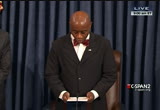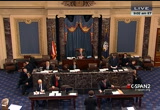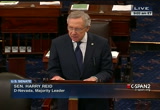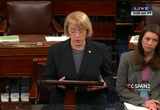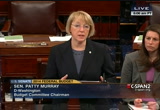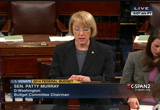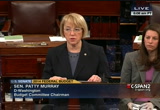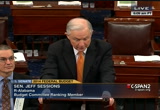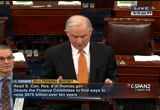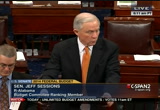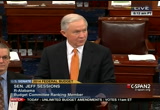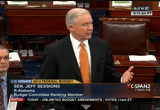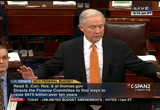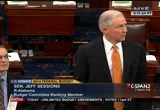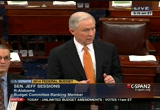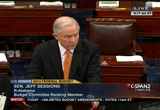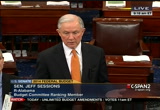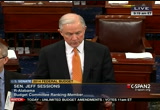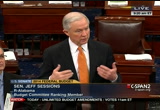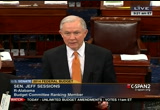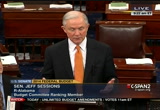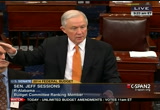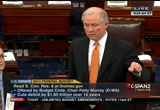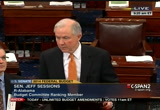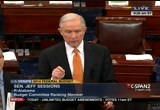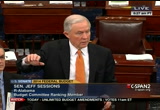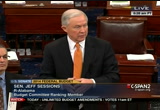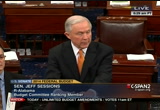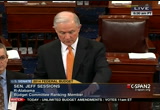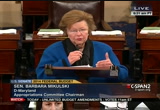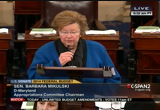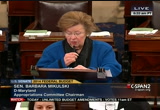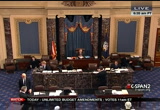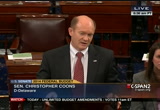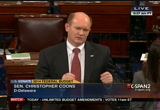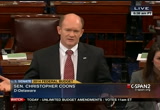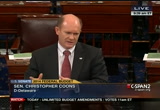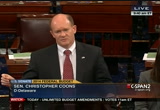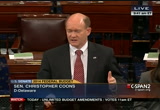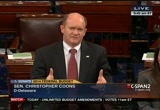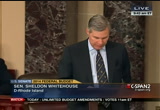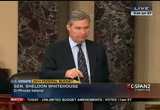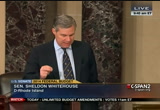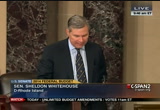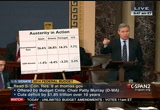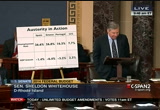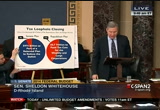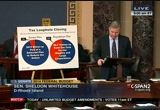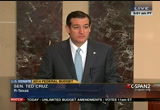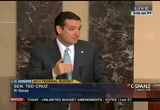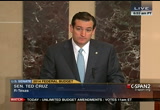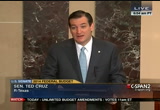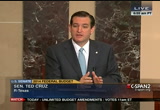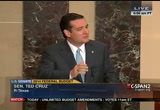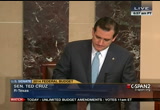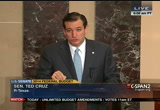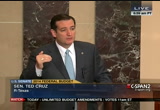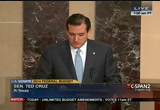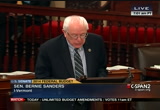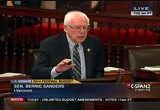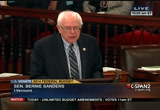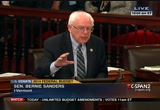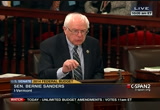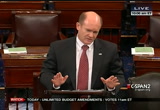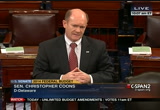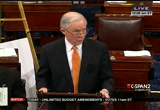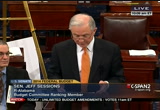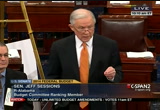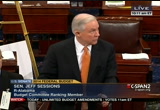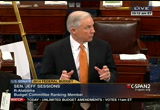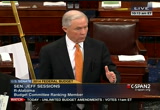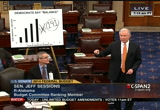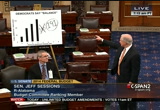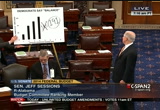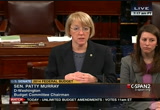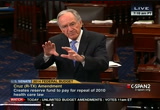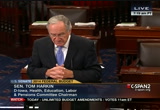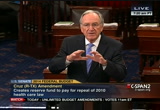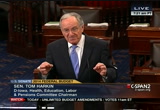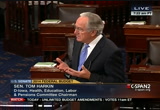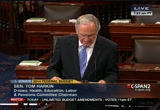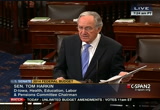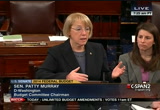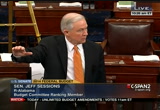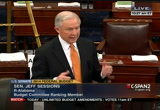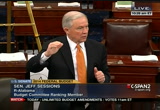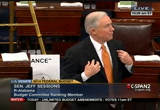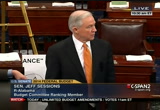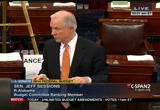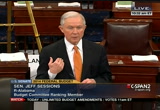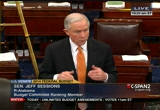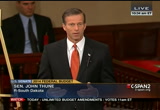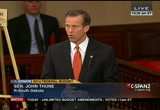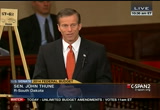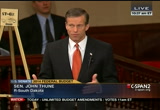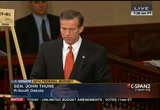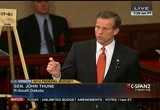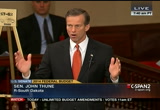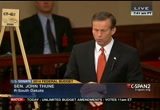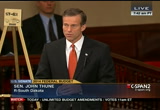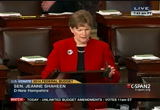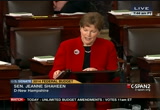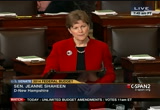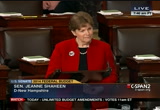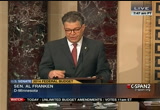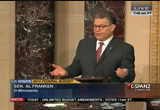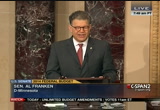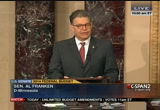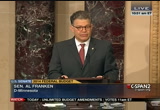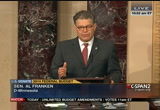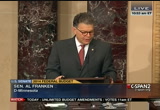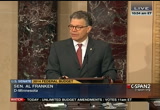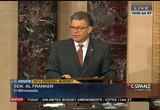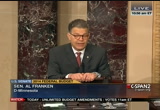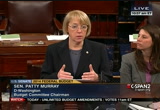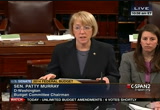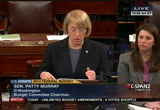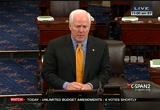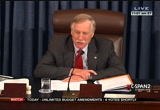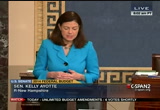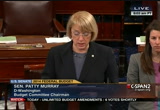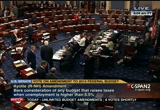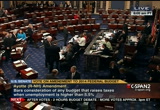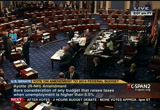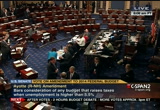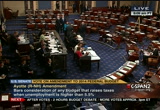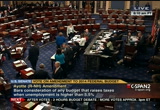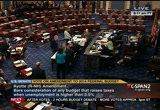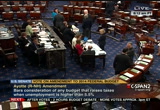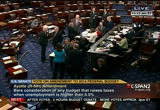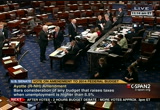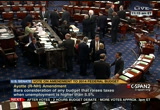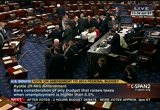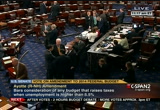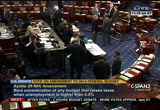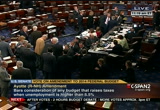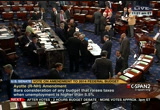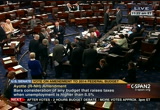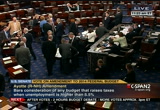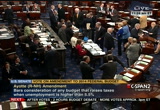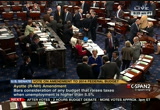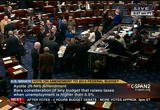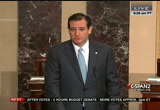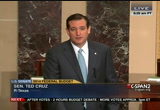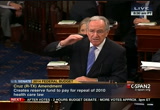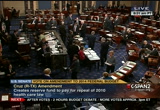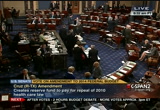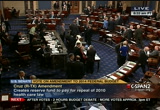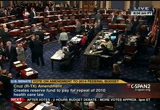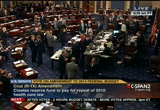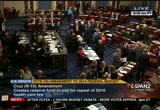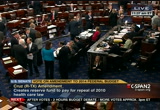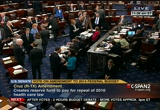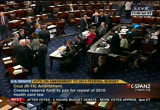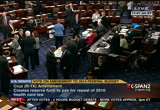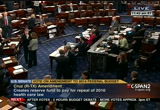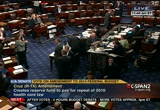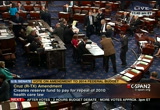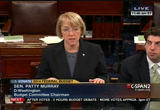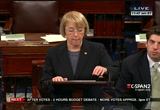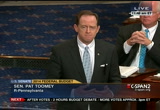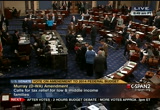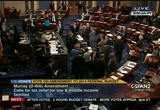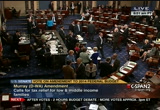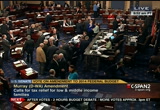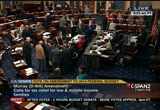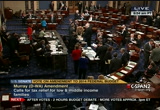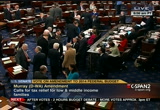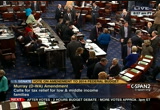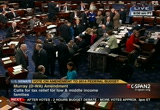tv U.S. Senate CSPAN March 22, 2013 9:00am-12:00pm EDT
9:00 am
with debate on the 2014 federal budget. votes on five amendments are set for 11 this morning. that'll be followed by further amendment debate and then a votearama, a continue vowsous vote on amendment. and now live coverage of the u.s. senate on c-span2. chaplain. god of love and grace, our love is pale and fitful compared to your infinite goodness. inspire our lawmakers with your guiding power so that they will pursue paths of peace and justice for all. keep before them your vision of bringing deliverance to captives
9:01 am
the recovery of sight to the blind and permitting the oppressed to go free. use them as healers and helpers and heralds of your good tidings to our nation and world. assure them of your love, as you give them eyes to see your saving truth. we pray in your merciful name. amen the presiding officer: please join me in reciting the pledge of allegiance to the flag. i pledge allegiance to the flag of the united states of america, and to the republic for which it stands, one nation under god, indivisible, with liberty and justice for all. the presiding officer: the clerk will read a communication to the senate.
9:02 am
the clerk: washington, d.c., march 22, 2013. to the senate: under the provisions of rule 1, paragraph 3, of the standing rules of the senate, i hereby appoint the honorable angus king, a senator from the state of maine, to perform the duties of the chair. signed: patrick j. leahy, president pro tempore. mr. reid: mr. president? the presiding officer: the majority leader. mr. reid: my understanding is that we are on the budget resolution. that's true, isn't it. it has been reported. the presiding officer: the clerk will report. the clerk: calendar number 28, s. con. res. 8, concurrent resolution setting forth the congressional budget for the united states government for fiscal year 2014, and so forth. mr. reid: mr. president, until 11:00, there is going to be conversation here on the senate floor. at 11:00, there will be six roll call votes.
9:03 am
offices, senators should understand, the first vote will be 15 minutes, after that, ten minutes. as we said yesterday, we enforced it yesterday, when the time's up, we're closing it. if the republicans aren't here, too bad, if democrats aren't here, too bad. we're going to have a lot of votes today. so make sure everyone's here. understand if you're not, you will -- the clerks have been asked to turn the vote in. after the votes, we complete the six roll call votes starting at 11:00. there will be two hours of debate remaining on the resolution. therefore, unless something untoward happens, the vote-a-rama is expected to begin around 3:00 p.m. this afternoon. we hope everyone would be -- would understand that we have had about 400 amendments filed, 400. we're not going to do 400 amendments. the average that we have on these vote-a-ramas is between 25 and 35.
9:04 am
and so i would -- everyone should understand that's about where we should wind up. everyone should be -- we are tired, the two managers have worked very hard on this for a long time, so be considerate of their time, thoughts and efforts also. mr. president, s. 649 is at the desk and it's due for a second reading. the presiding officer: the clerk will read the title of the bill for the second time. the clerk: s. 649, a bill to ensure that all individuals who should be prohibited from buying a firearm are listed in the national instant criminal background check system and require a background check for every firearm sale, and for other purposes. mr. reid: mr. president? on the save community, safe schools act, i would object to any further proceedings at this time.
9:05 am
the presiding officer: objection having been heard, the measure will be placed on the calendar. under the previous order, the leadership time is reserved. under the previous order, the time until 11:00 a.m. will be equally divided and controlled between the two managers or their designees. the senator from washington. mrs. murray: mr. president? mr. president, i want to thank ranking member sessions once again for another good day of vigorous debate. there are clearly some differences between us here in the senate, but all of our constituents benefit from having those views laid out and expressed clearly, and i really appreciate all that he is doing to help us move along as well as the good debate that we're having. mr. president, yesterday the senate did vote to reject the idea that balancing the budget by an arbitrary date should come before middle-class families and broad-based economic growth. last night, the senate voted to continue down the path towards a truly balanced approach to tackling our economic and fiscal
9:06 am
challenges. the kind of approach that cuts spending responsibly and calls on the wealthiest americans and biggest corporations to pay their fair share. we voted on an approach that puts our economy first and foremost and makes sure that we are protecting, not threatening our fragile economic recovery. that is the kind of approach that is supported by the vast majority of the american people and the senate stood strongly behind that. mr. president, the senate strongly rejected the budget that passed the house of representatives yesterday. their budget would meet the goal by balancing by an arbitrary date but would do it in a way that would be devastating for our families and the economy, dismantling medicare and ending up cutting taxes for the rich while raising them on the middle class. and not only that, but it did rely on gimmicks and tricks to hit that arbitrary date. there is nothing balanced about that kind of approach, and i'm very glad that every member of the senate had an opportunity to be clear about where we stand on that.
9:07 am
mr. president, the senate also voted yesterday to specifically reject the idea that medicare should be dismantled or voucherrized. i'm glad we had strong bipartisan support on that amendment. we also voted clearly for the idea that while both sides favor closing tax loopholes and ending wasteful reductions that favored the wealthiest americans and biggest corporations, the senate thinks some of that revenue should be used to tackle the deficit and invest in the middle class, not be used just to simply cut tax rates for the rich the way that the house budget did. so, mr. president, we have a few more hours of debate this morning between now and 11:00, followed by some votes, and then we will close out debate and move on to all the rest of the votes that we will take before final passage sometime late tonight or early tomorrow morning. i ask the senate -- as the senate majority leader said, we have hundreds of amendments filed. if we were to vote on every one of them, we would be here voting every single hour all the way through monday or tuesday.
9:08 am
i know most members know that's not going to happen. so i would really encourage every member of the senate to work with the manager on their side to let us know which amendments are your priority so we can get them up sooner rather than later and vote on the ones that you want us to. so i urge all of our colleagues to work with us and our staffs and with ranking member sessions and his staff to make sure we know what your priorities are, how you would like to proceed, and we will work with everyone to help combine some similar amendments, obviously, among those 400, there is a number that are similar. we will try and clear as many noncontroversial amendments by voice vote as we can, and we will get through as many votes as possible in a fair and reasonable manner and look forward to working with senator sessions to make sure we can do that. so thank you very much, mr. president. i encourage our colleagues. you have just a bit more time to have your say here before we will be just voting, so if you would like to have your say, please make sure our staffs know when you come down and make your statements. with that, i will yield to my
9:09 am
colleague, senator sessions. mr. sessions: mr. president? the presiding officer: the senator from alabama. mr. sessions: i have enjoyed working with senator murray. she is a strong leader. she makes clear decisions and sticks by them and executes them, so you have to respect that all within the rules of the share of the committee. we have disagreed on a number of things, and our vision for the financial future of america is quite different. i can understand how difficult it is to produce a budget. that's not an easy thing to accomplish. when you have got a divergent caucus, it is particularly difficult." politico "requesting said the budget was written by the left of the democratic caucus to the left of president obama. i think that's probably correct. it's a very big-spending, big-tax budget. it is the wrong thing for america. it's the wrong thing for economic stability. it's the wrong kind of plan if
9:10 am
made into law to help us grow our economy, create jobs, create wealth, get people over time and bonuses and pay raises, the kind of thing you have when the economy's growing. this budget is just the wrong medicine. i just have to say i strongly, strongly believe that it takes us in the wrong direction. what does it do at bottom? it raises taxes. it raises taxes, according to the chairman, by 1 point -- $1 trillion, $985 billion -- billion dollars. that's almost a trillion -- and we think it raises it $1.5 trillion. there is a reserve fund to make it easy to raise more taxes. i ask the chair to close that so it couldn't be used to raise taxes easily and see a decline
9:11 am
which would continue to cause me to believe that that is an additional part. but regardless, a trillion dollars of new taxes is a huge, huge tax increase. in january of this year, the president got a $650 billion big tax increase on the rich. and so this is a huge additional tax cut. plus a trillion in tax cuts in the president's health care bill. so we are already at $1.6 trillion in new taxes, adding -- proposing in this budget at least another trillion. so that's not healthy for the economy. we all know when you extract more wealth out of the economy, it does have effects. one of them is it weakens the economy and strengthens the central government, and the central government is not managing the people's money well.
9:12 am
and we have no interest, it appears, from this budget of listening to the american people and running their government better, leaner, more productive, get more bank for -- bang for the buck. what do we do? we ask for more money. we haven't done anything wrong. accepted us more money. and i have to urge my colleagues to honestly examine what the budget does. in addition to raising taxes, you would think that would help us, they say they have a balanced approach. we started -- if we started counting how many times my democratic colleagues used the word balance, i think it suggests a guilty conscience myself because the budget in no way comes close to balancing a budget. it doesn't pretend to. it explicitly rejects it. not an arbitrary date, not any date, not any date does it
9:13 am
propose balancing the budget. and, in fact, because it makes no changes in the drivers of our debt, the big entitlement programs, the big welfare programs, the interest on the debt, none of those are constrained by this budget, we know the next ten years that are outside the budget window will even be worse. they will be on an unsustainable course accelerating even off the course we're on today, which is unsustainable. so i am really disappointed. everybody that's been involved, everybody that's participated, whether it's a gang of six, a committee of 12, as our chairman did, the fiscal commission, all of those who participated know that the nearly 60% of the money the government is now spending, social security, medicare, medicaid, interest on the debt,
9:14 am
food stamps, those programs are out of control. they are entitlements, meaning we have set up legal standards that if those standards are met, you walk into the government office and demand the money, and they have to give it to you, and if they don't, you sue the government. i'm 68 years old. i want my social security check. we can't say we don't have any money. so this is the kind of thing that needs to be fixed now. it needs to be discussed now. every expert is an independent advisor to the government has said you guys need to get together and fix this. so what the budget that is before us says is nada, we're not going to fix any of that. we have no plans to construct any of that. and any of you guys that suggest that these programs have to be changed, we say you don't like old people.
9:15 am
we say you don't like poor people. we say you don't want people to have food. that's what we say. attack, attack, attack, when everybody knows change must occur. we know that. and it's not in this budget. nothing in the budget. so we don't change the programs within the budget. and i suggest that's not responsible. i suggest that's not a budget worthy of a party that says they want to lead america. the great democratic party is absolutely refusing to confront the great financial issues of our time? no, we won't talk about it and if you do, we're going to attack you, paul ryan, because you have a creative, insightful way to preserve medicare and make it more healthy in the future and put it on a sound path, we're going to say you're
9:16 am
trying to destroy medicare. he's got a plan to save medicare. bring it into the 21st the -- te 20th century --, 21st century. ought to be discussed openly and fairly, not demonized. that's the level of debate we're in here. so in private we talk to our colleagues and they say yes, we need to make changes, rereally do. well, when? and when the paper is printed, the budget is printed, it's not there. it's not there. so there's no reform of the fundamental drivers of our debt. we also know that last year we spent $750 billion on 83 government social welfare programs, means-tested programs. that is, if your income is below a certain level, the
9:17 am
government deems you worthy of subsidy of some kind. now, these 83 programs, many of them are duplicative, there's not a coherent focus to them that endeavors to help the people really other than giving them money. giving them aid. there's not a sufficient focus in all of these programs in actually helping that struggling mother with children who's out of work, who lost their job, who can no longer get overtime or bonus pay, and young -- young people who are struggling to get up on the ladder of work and prosperity. this is not helping them. and these programs are just temporary. we've got billions going out with unemployment insurance, food stamps, taxpayer assistance to needy families,
9:18 am
earned income tax credit. it's time for us to begin a massive overhaul, review of all these programs and several things could happen. one of them is we can make them better and we can actually move -- create programs that allow each person in their time of need to get temporary assistance to be able to refocus their lives, to move on to the work force, help them find the training that they need to get into areas that need jobs right now. and help them move forward. but you know what we have in our senate and among a lot of members of the house? we have a goal to see how many more workers we can bring in without effectively helping american workers who are unemployed. we've got an immigration policy that says we got jobs, we don't have enough workers. that's what the businesses are telling us. we don't have enough workers. they all add when they send us
9:19 am
that message, mr. president, they ought to say and, by the way, you need to give more welfare and more aid to people that don't have jobs. now, what's the disconnect there? we need to be protecting american citizens who are here, out of work, hurting today, minorities, blacks, and whites, and all colors and races that are hurting today with high unemployment and we seem to be more focused honor how we can ram through this senate a bill that would legalize millions and create an even more robust guest worker program. there's not enough jobs now. give me a break. so we're talking about $750 billion going out now in these 83 programs, projected to go -- projects to go up 80% in the next decade. that the total of those programs go up 80% in the next decade.
9:20 am
you know, we've calculated those numbers and if it went 60%, it would save a trillion dollars. i think we can make those programs more effective, helpful, organized are in a way that really advances the needs of poor people, and save a trillion dollars. that ought to be our goal. we -- we'll let it grow as much as we have to have it grow to take care of people in need. we're going to make sure people have their needs be 34e met in america that are struggling out there but at the same time it can be done better, and every american knows it. they'll talk to you when you asked ask them about it. they're uneasy about the easy money and the feeling that this system isn't working when it comes to government assistance. and i think they're right, don't you, colleagues? i really think so. so what does that mean? it means we should be having hearings and doing work to fix it, which we're not doing.
9:21 am
now, the challenge of our time is the unsustainable debt course this country is on. the challenge of our time is for us to demonstrate that we made the changes necessary to place this economy on a sound footing. i believe that the great minds of our time are not as smart as they think they are. i believe that in 2001 when chairman greenspan of the fed came before the budget committee and talked about what we were going to do when the entire debt of the united states was paid down, and he worried, we wouldn't know what to do with the money. and, of course, we are in a recession within a few months, and now we see demographically we're on an unsustainable debt course.
9:22 am
now the new fed chairman, mr. bernanke, as "the wall street journal" documented, was promoting mr. greenspan to spend more money and keep loose money before the housing crisis, just exactly the wrong advice. he didn't see it coming. he didn't see it coming. so we're not so smart around here. i'm worried about the future. what do i think responsible government policymakers should do? they should just provide a good, solid framework for the vibrant free market economy in this country to flourish. and we can't be the kind of off and on again, faucet for money and taxes and spending and not spending and bouncing around here trying to pass laws every few months to meet what's perceived as the financial goal of somebody on wall street at that moment.
9:23 am
we're not able to do that. what we should do is lay out a strong, clear policy, adhere to it, and let the business people risk their money with some ability to ascertain what those risks are, not expecting the government to come in and alter the situation, the rules of the game, a few months down the road. that's what we should do, create a sound framework. we're not doing that and i'm concerned about it. finally, this budget increases spending. it increases spending very dramatically. at a time when we don't need to be increasing spending at this rate, and we're increasing spending above the rate we're currently set to operate on. the budget control act line, which allows for increasing every year, spending, but this budget spends more than that.
9:24 am
and it raises a trillion dollars in taxes at least, and it expends all those new taxes, eats that up with new spending. had we stayed on the current -- if it called for us to stay on the current baseline of spending, growth, that's going up, and we raised a trillion dollars in taxes, we would have a trillion dollars in reduced deficit over the next ten years. but it spends more money. and it eats up the new taxes with new spending. it really does. this is a failed plan that's been produced by the majority party in the united states senate. we can't -- when people heard this -- this is what's being said to the american people, and we all know it. the democratic leadership is saying we've got a budget that's balanced, and what does that mean? it means, well, we're going to pay down the debt but it's not all going to be cutting spending, we're going to pay down the debt by raising taxes
9:25 am
and cutting spending. raise taxes a trillion dollars, cut spending a trillion dollars, we have a $2 trillion reduction in the deficit. doesn't that sound good? that's the kind of things the american people would like to hear. it's not enough. we could do more and don't have to do loot more and we'll have a budget balanced. but it doesn't do that. colleagues, it doesn't -- it raises taxes a trillion but it raises spending a trillion. it doesn't cut spending a trillion. it raises spending. and therefore we got no deficit reduction at all, but we have a new trillion-dollar tax. the government is saying to the american people we need more money. we don't have any way to cut any spending, and that anybody proposes that there are abuses in the food stamp program or
9:26 am
there are abuses in other programs out there, that we are wasting money on energy loans by the billions, solyndras and a-123's and those kinds of companies, they're saying all of that, but we can't save any money. there's no money to be saved. you just send us more money. and then we will pass it around, and this will stimulate the economy. so i'll conclude, i see we've got some colleagues that are here. i'll just say this: the debt that we have today, i have become absolutely convinced is too high. the gross debt of the united states is 104% of our economy. it's above our g.d.p., which is
9:27 am
almost $17 trillion -- that debt is almost $17 trillion now. what we've seen from the rogoff and reinhart study and from recent reports by the international monetary fund, report by the european central bank, report by the bank for international settlements, all say when debt is as high as we are today in the united states, that begins to pull down growth. so my colleagues claim that they have a budget, they have a budget that will help create jobs. i would say, with all respect, we have a disagreement. you believe you can tax more and spend more and borrow more, and that that will somehow create growth and prosperity. i believe we've had four years of that experiment, which i fundamentally doubted and opposed from the beginning, and
9:28 am
it hasn't worked. you can't take a bucket of water from one end of the pool and pour it in the other and gain from it, especially when the bucket's going to leak a good bit of it in the process. so what i would say is the debt now is so high, according to all of those reports, the debt of the united states is in the zone that they craft -- that they have analyzed, when your death -- debt gets into that zone, you lose growth. rogoff and reinhart, the bank of international settlements, we're in that zone. so if we want to from have growth, we have to get our budget under control and balance it. and if you balance it by allowing growth to occur at 3.4% without having to cut over ten years but if you allow our growth to increase at 3.4%
9:29 am
instead of 5.4%, the budget balances. so we don't have to slash and burn, but we do have to get off the course we are on, which isn't easy but that's what we're paid to do, to be responsible. so if we got off that course, began to see our debt-to-g.d.p. go down when a balanced budget, even over a ten-year, responsible period, would do, then we can actually honestly say we've strengthened america, we've put us on a sound path, we've allowed the economy to grow again. and there is no doubt in my mind, colleagues, and i doubt yours, that if the world were to see that the united states was on a path to a balanced budget, wow. they would say really? this death spiral of the united states and all these big, fat western nations have been on, maybe others can do this, too.
9:30 am
maybe this is the place to invest our money. i believe it would help growth, help investment, help put the country on a sowched sownd path and i'm disappointed this doesn't do it. i respect my colleagues. we had a great time in the meet. we have had a good time on the floor. senator murray is a good chair. but the left, i guess, of the democratic caucus has produced a budget here that won't work. it does not meet the challenge of our time. it's deeply disappointing. i guess there is still some chance something might happen in conference, but from the looks of this budget, the chances aren't very great, i have to say. mr. president, i thank the chair for this student and would yield the floor. a senator: mr. president? the presiding officer: the senator from delaware. mr. coons: i'd like to yield ten minutes off the resolution to my
9:31 am
friend and colleague, senator mikulski, the chair of the appropriations committee. the presiding officer: the senator from maryland. ms. mikulski: thank you very much. senator coons. i probably won't take ten minutes, but what i speak about is really the -- is really compelling. later on during the vote-a-rama, i will be offering an amendment that will create a reserve fund that should we pass the paycheck fairness act, it will in no way negate the spending within our budget. it is essentially the functional equivalent of a sense of the senate resolution that the senate should pass the paycheck fairness act. we talk a lot about growing the economy. the economy will grow when people work. the people that are entering the work force that have been one of the driving forces for the last 30 years are similar, and although we are in the work force full force, we are still not being said equal pay for
9:32 am
equal work. it is outrageous. and if you want to grow the economy, pass paycheck fairness where we are not harassed for simply trying to find out what is our pay, how can we get equal pay for the same job? women across america are worried about staying in the middle class if they are already there and getting to the middle class if they're not there. nearly 50 years after the passing of the equal pay act, women still get paid less than men. this budget is a reflection of our values and priorities, and eliminating the wage gap should be one. for years, i and other colleagues have fought for paycheck fairness. under that act, no longer would employers be able to retaliate against workers for sharing information about wages. right now if you ask someone what you get paid, you could get
9:33 am
fired. this bill follows on from the famous lilly ledbetter act. lilly herself was humiliated and harassed because she tried to find out what she was making. no longer will women be able to seek only back pay when they are discriminated against. under this bill, they could also seek punitive damages, but no longer would employers be able to use almost any reason for paying a woman less. oh, the men do harder jobs. oh, they have a better education than you. and in fact, the reverse is happening. women entering the work force are often better educated, with more academic and trade certifications than men who are doing it. and women are also doing hard and dangerous jobs. we can look to what they do in the military. they can look at how we see them as firefighters and police officers and prison guards. under the legislative i am
9:34 am
proposing, no longer will women be on their own and fighting for equal pay or for equal work. in this country, we say work hard and play by the rules, you'll get ahead. we work hard every day but we find that the rules are different for women and for men. actually, the rules in many workplaces are rigged against us. so, mr. president, i would hope that we would pass my amendment today that would allow us to be able to go forward later on in the year and pass paycheck fairness. it is important to the women in the workplace and it's important to our economy. much is being said here about being pro growth. who isn't pro growth? of course we want to grow our economy. and if we look at the tax structure, i believe we should -- right now the tax structure is tilted and the tax breaks that we give is to reward
9:35 am
people who make money off of money, not people who make money off of products with the sweat of their own brow. and so, mr. president, i think that we need to take a look at the tax code. in my state, we are an entrepreneurial-driven state. we are the innovation economy, in biotech, cyber tech, space tech. at the same time, we have people work hard every single day, in agriculture, in poultry, in mining, in trying to earn a living by really very hard work. and i believe we should have a tax code that rewards it. i yield the floor. mr. coons: mr. president, how many minutes are remaining on our side? the presiding officer: 48 and a half. mr. coons: thank you. mr. president, we have heard a great deal about balance in the debates on the floor and as we move towards voting on a budget resolution, i just want to
9:36 am
remind all of us in this chamber today to keep in mind that a balanced path forward has broad support across all of america. folks are looking for us to take a path toward steady and responsible deficit reduction, investing in growing our economy, excessing in helping our private sector grow good jobs while still honoring the pledges we have made to america's veterans, seniors, to those who rely on some of our most important, most treasured programs, medicare, medicaid and social security. there is a sharp contrast and that contrast will be clear and clearer as this day goes on between the values embedded in the ryan budget passed by the house and the budget led ably by chairman murray and the senate democrats in the budget committee that will be taken up later today. we will be considering dozens, perhaps hundreds of amendments that will touch on a very wide range of issues, from paycheck fairness and gender equity as referenced by senator mikulski just a few moments ago to issues very widely ranging, ones that i have helped champion on the
9:37 am
budget committee that would increase investment in manufacturing and making sure that our manufacturing sector is more competitive. ones that allow us to strengthen our r&d sector, strengthen our education sector, ones that ensure that we preserve and protect these valued medicare and medicaid programs that i referenced. but more than anything, mr. president, i think at the end of the day, the challenge on all of us is to help the american people understand the fundamental difference in values reflected in these two different budgets. and i know we will be joined in just a few minutes by colleagues who are coming to speak to that point to help lay out for the american people the fundamental difference between these two budgets. if i might sort of at the highest level for a moment, i wanted to remind folks who might be watching, folks in the chamber that a budget resolution is quite different from the budgets that, mr. president, you might have been used to as a governor, that others of us were used to from the private sector or from state or county or city government. a budget resolution doesn't have
9:38 am
in great detail every single item to be spent by this government. as state budgets are submitted to general assemblies or legislatures, they typically have in enormous detail exactly how the state will spend its funds in the year ahead. this budget resolution sets a framework. it sets sort of top level spending targets and then directs the committees of jurisdiction to achieve either changes to the tax code, the finance committee, or changes to vital programs in other committees, whether defense or help or others. so when we talk often about the values embedded in a budget resolution, that's in part because a budget resolution is just the beginning of a regular order, healthy budget process. it then has to be complimented -- complemented with authorizations bills and with appropriations bills. but if you compare the budget resolution that's already been adopted in the house and that was rejected in a vote here on the floor last night with the budget resolution that's come out of the senate budget committee, i think you see a few simple, stark differences.
9:39 am
both budget resolutions raise a significant amount of revenue through tax reform by closing so-called tax loopholes or cutting spending through the tax code. this is spending that isn't reviewed every year. this is spending that often has been stuck into the tax code through the efforts of the wealthy, well connected, powerful interests in our country that don't get reviewed every year, and it is time for us to look seriously at our tax code to make it leaner, easier to understand, easier to enforce, more efficient and to make our country more competitive. but a core question we have to address, mr. president, is to what end do we put the revenue raised through changes to our tax code? in the house budget resolution they raise if i remember roughly $5.7 trillion over the ten-year budget period. all of which is dedicated to reducing the tax rates on the wealthiest americans and on the most profitable corporations, reducing rates on corporations and individuals. the much smaller amount raised in our budget plan, $975 billion
9:40 am
over ten years through cutting spending through the tax code is dedicated to deficit reduction. the balanced path that we have talked about that balances reduction in the deficit through new revenue raised by reforms to the tax code with comparable spending reductions across all areas of our budget is the sort of balanced plan that was on the ballot, that was a critical part of the 2012 election process and that i frankly think the american people have broadly embraced. we have put forward a budget that meets the values agenda that our democratic budget committee stands behind. to invest in critical areas of our economy, whether infrastructure, education or r&d, to help lift the private sector and help grow jobs again, to keep our most vital commitments to seniors and to veterans and to those most at risk in our society while still making responsible, steady progress towards reducing our crippling deficit and debt. we get the deficit down to less
9:41 am
than 3% of g.d.p. at the end of the ten-year period, we stabilize our publicly held debt at 70% of g.d.p. these are the targets broadly agreed on by every major bipartisan group that has looked at the challenges facing the united states, our economy and our budget. i remind you that the bowles-simpson commission, a bipartisan commission, came up with a rough target of $4 trillion in savings over a decade. this plan, this budget resolution would achieve, in fact would exceed that target in a way that has balance and that i believe is responsible. i would be happy to talk further then, if i might, mr. president, about some of the other issues contained both within our budget resolution and in contrast with the budget resolution coming over from the house. as a number of my colleagues have spoken about movingly on the floor in recent days, one of the most important differences is in the future of the fundamental entitlement programs that are part of the progressive legacy of f.d.r. and l.b.j.,
9:42 am
that were put in place really with both republicans and democrats over many years, strengthening and sustaining them. we see a fundamental difference in direction between what's happened in the house and what we propose here in the senate. in the house, to put it simply, they would change medicare from a federal guarantee, from a program that provides health care to millions of americans to a voucher program, one where the federal government provides not a guarantee but premium support, a voucher, something that would shift costs on to seniors, on to states and on to communities. and in medicaid, in my view, even worse because it supports the most vulnerable in our country. they would turn it into a block grant. this would shift more than $800 billion on to the balance sheets of states. to talk further about these important differences and the values between the house and the senate budgets and to talk about its impact on the future of the united states, i'd like to yield seven minutes to my colleague from the state of rhode island, senator whitehouse.
9:43 am
the presiding officer: the senator from rhode island. mr. whitehouse: thank you, senator coons. the senate budget resolution that we worked so hard on would first replace the harmful budget sequester whose effects are only beginning to be felt in our communities with balanced deficit reduction. second, it would invest in our crumbling roads, bridges and water infrastructure. our engineers give our infrastructure a d-plus. clearly, we need to make that investment. and it would support continued job creation and economic growth. despite this sensible, balanced approach, not a single republican supported this budget in committee. republicans prefer to raid the programs that the middle class depends on, while protecting the rich and the well connected.
9:44 am
a cbs news poll conducted last september shows that 78% of americans favor continuing the current guarantee of medicare coverage for seniors. 78%. but the republican budget would gut medicare, turn it into a voucher program for those 55 and under, basically put medicare into a death spiral, and it would end the medicare guarantee that for half a century has been the pillar of american retirement. more than 3 million seniors right now save an average of $700 a year on prescriptions because we closed the dreaded doughnut hole. well, the republican budget throws them right back in the doughnut hole, forcing today's seniors to pay an additional $700 a year on average out of pocket. 60 million americans got to college and were able to seize their dreams because of pell
9:45 am
grants. the republican plan cuts pell grants, dropping an estimated million students from this vital program. this ryan republican plan to turn medicare into a voucher program is so extreme and so radical that even republicans are speaking out against it. congressman david mckinley voted against the ryan budget and he said my home state of west virginia has the highest percentage of medicare beneficiaries in the country, and i cannot support a plan that the congressional budget office has determined would nearly double out-of-pocket health care costs for future retirees. and, of course, former speaker newt gingrich described this plan as right-wing social engineering. this republican budget makes enormous mystery cuts in the budget. chairman ryan claims he can cut $900 billion of appropriated domestic spending over the next ten years. that means border security,
9:46 am
that means the f.b.i., that means medical research, that means student financial aid, that means the grants that support our efforts to combat violence against women. under the extreme radical republican budget, domestic discretionary spending will fall to its lowest level as a share of g.d.p. since we started keeping track in 1962. 1962. there weren't even pell grants in 1962. there wasn't even medicare in 1962. their future is our distant past. chairman ryan would push $810 billion onto our states to shift costs to the states for medicaid, and find another mystery $962 billion in unspecified entitlement grants. he boasts that the republican budget repeals obamacare, but he puts all the savings from obamacare in the budget. you can't have it both ways. it's not even an honest budget.
9:47 am
it's politically, mathematically and logically unrealistic. it's not a balanced budget so much as magical thinking. even if the unrealistic program cuts in the republican budget could be made, the plan ignores the economic damage that would result. we have had the austerity experience. we have had the austerity experience in europe, and the evidence is in. deep austerity cuts in spain, greece, and portugal caused persistent double-digit unemployment and negative growth rates. we may be impatient with our unemployment rate, we may be impatient with our low positive economic growth rate, about the countries that tried what the republicans want to do have double-digit, 26% unemployment rates, and their economic growth is negative. their economies are shrinking.
9:48 am
"the wall street journal" just reported that industrial production in the u.k. after its austerity plan has fallen to its lowest level in 22 years and the country is looking at a third recession. the republicans who want to emulate european austerity should consider what jeremy warner said in the conservative "daily telegraph." i quote, "this is a truly desperate state of affairs. we seem to have the worst of all possible worlds with nil growth, very obvious cuts in the quantity and quality of public services but pretty much zero progress in getting on top of the country's debts." that should be a warning. not only is the ryan republican budge's unrealistic, it's unfair. it achieves 100% of deficit reduction by cutting government programs that benefit lower andle middle-income americans while doing nothing, not one
9:49 am
dime from wealthy americans or corporations. in fact, it would cut the high-end tax rates for wealthy individuals. it adds tax breaks for the rich and well connected and goes after the middle and lower-class families. the republican budget cuts total education and work force training for instance by an estimated 47%. it cuts $135 billion out of the food stamp program which helps feed the poorest americans, and at the same time if you're making over a million dollars, it offers you an average budget cut of -- tax cut of $330,000. and for the kind of money that the ryan republican budget wants to give to the rich and the well connected, they have to come after the million-dollar class. chairman ryan -- the million class. it would require $5.5 trillion in new revenue and to cover that price tag, president clinton revealed the hard truth. i'll quote president bill
9:50 am
clinton. "they'll have to eliminate so many deductions like the ones for home mortgages and charitable giving, that middle-class families will see their tax bills go up. that's the promise of the ryan republican budget. million-dollar-class families will see their taxes bills go up. we don't. we take 7% out of that which means we can focus on the corporate tax spending, on the high-end deductions, the carried interest exception. so we don't have to go officer a the middle class tax cuts. let me close by reading one thing if i may have consent. we have just welcomed a new pope. the conference of catholic bishops had this to say about the ryan budget last year. congress faces a difficult task to balance needs and resources and allocate burdens and sacrifices. just solutions however must require shared sacrifice by
9:51 am
all, including raising adequate revenues, eliminating unnecessary military and other spending and fairly addressing the long-term costs of health insurance and retirement programs prams. the house-passed budget resolution fails to meet these moral criteria. i yield the floor. the presiding officer: the senator from delaware. mr. coons: thank you, mr. president. i yield the floor for an address by a member of the opposite party. the presiding officer: tropical storm alabama. mr. sessions: i'm pleased to yield up to ten minutes to senator cruz of texas. the presiding officer: the senator from texas. mr. cruz: mr. president, i want to thank my friend from rhode island for his stirring remarks and indeed his powerful argument against this nation going down the road of greece and spain and much of europe. those were indeed compelling statistics of 27% unemployment in greece and negative, nearly 7% growth in greece. and i found myself moved looking
9:52 am
at those statistics that all of us should act and act with leadership to prevent going down that road, to stop the out-of-control spending, the out-of-control debt that put greece and spain in those circumstances. we are right now in a situation where our nation faces debts larger than our entire economy, greater than 100% of our entire economy. that's where the united states is right now. and i would suggest the irresponsible policies of this congress and this administration is why we are seeing stagnant growth. last quarter, our economy grew 0.1%. and i found my friend from rhode island's speech was quite powerful for arguing why every member of this body should vote against the democratic budget that will be coming up for a vote because it is clear that raising taxes $1.5 trillion on top of the $1.7 trillion tax
9:53 am
increase that has already been put in place will only accelerate our path to where greece and spain and much of europe is. adopting a budget that never balances in perpetuity as sadly, the democrat budget does, will only accelerate our path to where greece and europe is. i thank my friend for that stirring recitation. i would note tomorrow is an important milestone. tomorrow is the three-year anniversary of the adoption of obamacare. as we vote later today, i will be introducing and amendment to establish a deficit neutral reserve fund to provide for the repeal of obamacare. obamacare was passed with many promises and yet the reality, it has not delivered. when obamacare was being proposed, the president told americans the average american family would see our premiums drop by $2,500. instead, today the average american family has seen our
9:54 am
premiums rise by $3,000. that's a $5,500 difference between what was promised and what was delivered. young people in particular have been hit incredibly hard by obamacare. the actuaries predict young people trying to climb the economic ladder could see their premiums rise anywhere between 145% and 189%. seniors also have been hit severely by obamacare as a result of obamacare, 14 million -- some 14 million, nearly 15 million seniors are on medicare advantage. half of them will lose their medicare advantage coverage as a result of obamacare. seven million seniors will lose medicare advantage, and i would note a very large percentage of those are low-income seniors, or hispanic seniors, or african-american seniors. every one of us should ask when confronted with hispanic seniors
9:55 am
in our states, why is it that we are content to see seven million seniors lose their medicare advantage program? i would suggest we should not be. last wednesday, all 45 republicans stood united voting in support of an amendment i offered to delay funding obamacare at least until our economy gets growing. our economy is snag national interest -- snag national right now. last quarter it was 0.1% and sadly, every democrat who voted, voted to continue implementing obamacare even as the economy is gasping for breath, and to risk very potentially knocking this nation into a recession. i would urge this body to reconsider that decision and when so many people are hurting not to put the kind of impact that could send this country backwards into a recession. obamacare itself includes some 20 tax increases over $1 trillion, and many in this body
9:56 am
talk about the middle class, many of those tax increases fall directly on the middle class. now, yesterday over 70 members of this body voted against the medical devices tax. i celebrate that. that is a terrific recognition of the tax burdens of obamacare, and i hope that that amendment is not simply voted on in an aspirational sense but that it becomes law and we repeal that amendment. and yet, mr. president, i would suggest the medical devices industry, a critical industry, employs a virtual army of lobbyists. the lesson yesterday illustrated is if you are wilt wealthy, if you are an important industry with lobbyists that can get senators to come to cocktail parties, you, too, can see some of the burdens of obamacare perhaps lifted from you. but as we voted for that and i happily voted to lift that tax,
9:57 am
it struck me, what about the millions of small businesses that don't have lobbyists in washington, that don't have the ability to corral senators and say it is so important that this burden not fall on me. we respond quite rightly to the pleas from one powerful industry, and yet we ignore the pleas from the mom-and-pop shops, from the millions who are struggling and i will note if you look at the hispanic community, there are 2.3 million hispanic small business owners in this country, roughly one in eight hispanic households is a small business owner, and you know what? they don't have lobbyists here that capture the attention of some 70 senators. instead, they face the cost and the burdens from obamacare. i want to just read to this body a couple of recent press stories illustrating this is not a republican talking point or a democrat talking point point. these are the facts. this is what is happening under obamacare. the associated press on march
9:58 am
13, 2013, so just earlier this month. reported -- this is the opening line of the story -- quote -- "some americans could see their insurance bills double next year as the health care overhaul's laws expands coverage to millions of people. it goes on to say the biggest price hikes are expected to hit a group that represents a relatively small slice of the insured population, that includes some roughly 14 million people who buy their own insurance as opposed to being covered under employer-sponsored plans and to a lesser extent, some employees of smaller companies. yet again, the impact of obamacare hitting small businesses, hitting the struggling entrepreneurs. and i would note, mr. president, two-thirds of all new jobs in our economy come from small businesses. if this body continues to make it harder for small businesses to survive, we will continue to see 23 million americans in this country out of work because the new jobs are going to come from
9:59 am
small businesses and we cannot continue to put more and more costs and burdens on them. the associated press continued, young people who currently have low-cost coverage may see some of the biggest hikes. to all of the college kids right now, who stood for hope and change, to all of the young people who coming out of school are struggling to find jobs and not able to find jobs right now, i would point out that with the associated press reported that alone -- the obamacare impact -- could cause the premium for a 24-year-old who pays $1,200 annually to jump to $1,800. as their premiums go up, as they see additional dollars taken out of their pockets, as they're struggling to climb the economic ladder, i hope young people realize the cause for those impacts. just this week "the washington post," hardly a bastion for conservative thought, had a
10:00 am
major story headlined "health care law uncertainty grips old town alexandra cafe and other small businesses." and it explains that there is a cafe in old town alexander and there is confusion among business owners particularly about what you have to cover and how you have to report. i am convinced that the primary reason we aren't seeing a robust economic recovery is the uncertainty and costs associated with this health care law. this is from a small business owner saying why don't we see growth, why don't we see the economy booming? because obamacare stays in force and it is crippling jobs. "the washington post" continues that one in eight small business owners who responded to a survey by the national federation of independent businesses said
10:01 am
their health insurance providers had notified them their comans would be terminated, one in eight small businesses. a study released last week by adecco human resources consulting firm -- very good. i would urge that obamacare be repealed and i yield the floor. mr. coons: mr. president? the presiding officer: the senator from delaware. mr. coons: thank you. i yield five minutes to my colleague from vermont. mr. sanders: i thank my friend for yielding. i rise to ask support of amendment number 198 that i will be offering which establishes a deficit-neutral reserve fund to protect the benefits of disabled veterans and their survivors which may not include a chained c.p.i. this amendment, mr. president, is supported by the american
10:02 am
legion, by the -- which is the largest veterans' organization in our country, the aarp, the veterans of foreign wars, the afl-cio, the disabled american veterans, the national committee to preserve social security and medicare, gold star wives, the alliance for retired americans. in fact, this amendment is supported by every veterans' organization, every major senior organization, 12 million workers in the afl-cio, every disability organization and the national organization for women. now, why are they all supporting this amendment? because they understand that at a time when millions and millions of veterans are struggling to keep their heads above water economically, they understand that when we have millions of seniors today who are having a difficult time buying the prescription drugs that they need, the food that they need, the ability to heat their homes, it is cruel and
10:03 am
impork-barrel to turn our backs on veterans, to turn our backs on seniors and make disastrous cuts to the benefits for disabled veterans and for seniors. under the chained c.p.i., a disabled veteran who started receiving v.a. disability benefits at age 30 would have their benefits cut by more than $1,400 at age 45, $2,300 at age 55, and $3,200 at age 65. now, memorial day is coming. i know that many of my colleagues all over the country are going to give speeches to veterans, and they are going to be telling veterans how much they support and respect the sacrifices they have made. well, it's time to go beyond -- beyond fine rhetoric and fine speeches. if we are serious about protecting the needs of veterans, now is the time to
10:04 am
stand tall. they have protected us. now our job is to protect them. it is wrong to balance the budget on the backs of disabled veterans, pure and simple. what the chained c.p.i. would do to seniors on social security is equally bad. in my state, we have many, many seniors, and i dare say in maine as well who this winter wonder how they are going to get the money they need to heat their homes, to buy the prescription drugs they need. many of them are living on $13,000, $14,000, $15,000 a year. social security benefits. the chained c.p.i. would say to them that if you're 65 today, by the time you're 75, your benefits would be cut by some $650 a year. by the time you're 85, your benefits would be cut by $1,000 a year. mr. president, i'm going to be offering another amendment above
10:05 am
and beyond the chained c.p.i. which makes the point that every single year we are losing tens and tens of billions of dollars, because the largest corporations in this country are putting their money in the cayman islands and bermuda and paying zero, zero in federal income tax. one out of four profitable major corporations pays nothing in federal income tax, including some of the wall street firms we bailed out a few years ago. what this whole debate is about is how do we go forward with deficit reduction in a way that is fair, a way that is moral and a way that calls for good economic policy? and i would argue that when some of the largest corporations in america pay zero in federal income taxes, before you cut social security, before you cut benefits with disabled veterans, ask those people to start paying
10:06 am
their fair share of taxes. we are in a horrendous recession. real unemployment is over 14%, counting those people who have given up looking for work and are working part time. median family income since 1999 has gone down by $5,000. mr. president, let us not balance the budget on the backs of the most vulnerable people in this country. mr. president, i ask unanimous consent to add senator whitehouse to my amendment number 198. the presiding officer: without objection. mr. coons: mr. president? the presiding officer: the senator from delaware. mr. coons: if i might, i just simply wanted to reassure those who might be watching in the chamber, the democratic budget, the budget resolution that's advancing further today reflects in some ways our most fundamental values and makes
10:07 am
responsible progress towards reducing our deficit. we have already done more than $2.4 trillion towards deficit reduction since the time the bowles-simpson commission suggested an overall target of $4 trillion in reductions in federal spending. with this additional $1.85 trillion, we'll get to about $4.25 trillion. we are making responsible progress. as my colleague from vermont and as many others have come to the floor and spoken about, we need to do that in a way that still keeps our commitments to america's seniors, to america's veterans, to the most low-income and vulnerable in our community. we need to do it in a way that both stabilizes our deficit and debt, makes critical investments in growing our economy and preserves the core of the programs on which americans rely. this is not just about numbers. it is also about values. it is also about priorities. so if i might, mr. president,
10:08 am
before i yield to the full committee chair, i just wanted to say that i am grateful to chairman murray for everything she has done to bring us to this point. in the three years in which i have served in the united states senate as a member of the budget committee, we have not had a budget resolution on this floor. the very difficult, very long process we are about to go through may be a reminder of how challenging legislative compromise can be. it is my hope that we will engage in a thorough and vigorous debate and that yet by the end of this legislative day we will have a budget out of the senate of the united states. with that, madam chair. mr. sessions: mr. president? the presiding officer: the senator from alabama. mr. sessions: as we consider the budget that is before us today, i would call my colleagues' attention to the fact that the democratic budget, the murray budget, was voted down in the house of representatives two days ago by 107 votes.
10:09 am
1/5 of a democrat, one out of five, 20%, voted against this budget and no republicans voted for it, and i guess that's because, as "politico" said, to win over our caucus and get the votes necessary to move it forward, quote -- "murray begins from the left of obama himself." and with regard to independent evaluations of the budget, the united states -- "usa today" editorial on march 15 said this -- "a plan produced by the senate budget committee chair patty murray is a disappointing document. it is a namby-pamby plan that underwhelms at every turn. the murray budget neither balances the budget nor reins in entitlements." that's exactly true. he goes on to say -- quote -- "the nation would be helped if democrats were to embrace the ryan goal of a balanced budget."
10:10 am
close quote. that'sed toed to. i guess the largest print paper in the country -- that's "usa today." the largest print paper in the country. that's their view. "the washington post" said on march 15 -- quote -- "this document -- talking about the document before us -- gives voters no reason to believe that democrats have a viable plan for or even a responsible public assessment of the country's long-term fiscal predicament." close quote. "the wall street journal" investment business daily, "the hill" and others have comments in somewhat the same vein. what is our problem? our problem is spending. so you say well, sessions, that's just what you republicans say, and we say it's not taxing the rich enough, but don't -- there is a fundamental issue
10:11 am
here about spending. i dealt with and asked questions of whether elmendorf, our c.b.o. director, on this very subject, and it went to this point. colleagues, we need to understand this, the american people need to understand it. taxes, whatever rate they are, tend to grow with the economy, so if the economy is going up 2%, more people make a little more money and taxes tend to go up 2%, but if the economy is growing at 2% and your spending is going up 5.4%, then you have got a problem. you can raise taxes. and i asked mr. elmendorf this. even though we had a trillion-dollar deficit last year, 1,000-plus billion -dollar deficit last year, unbelievable debt, almost 35% of the money we spent last year was borrowed,
10:12 am
and we will pay interest on that for decades to come because there is no plan to pay it down in any significant way. so i asked mr. elmendorf if we raise taxes instead of $650 billion as we did in january, we raised them enough to balance the budget, would we stay in balance? and he acknowledged that if the economy continues to grow at 2% and growth of spending is at 5%, we will immediately be back into a problem area. and so in one sense, this is the very definition of unsustainability. this is the very definition of the problem we have. that spending is growing faster than the economy, and it cannot maintain itself at that rate.
10:13 am
now, we can spend and we can say we have got a balanced plan, a balanced program, a balanced approach, as my colleagues have, but they know this budget never balances, not in one year, not in ten years, not in 50 years, and it's going to get worse in the second ten years. absolutely will be worse. and this is the path that senator cruz just indicated that greece and spain and italy have got -- that they have followed, and that's why they are in trouble. so my colleagues say well, the economy isn't growing well, and it is not. we had virtually zero growth last quarter, zero. we're supposed to be moving out of the recession. as i pointed out last night, c.b.o. for the last several years had been predicting 4% growth. not this year now, after missing
10:14 am
it about two percentage points for the last several years. they are predicting low growth this year. so what do our colleagues say? well, they say they have got a balanced approach. they just keep saying it. and you know, i'm -- i grew up in the country. i went to a great little school. there were 30 in my senior class. i'm proud my colleagues -- my classmate is the president of the university of alabama now out of our little class, but i would just say this -- i know what a balanced approach means. it means nothing. a balanced approach is an unaccountable statement. it provides no ability for the american people to ascertain whether or not people are doing anything they promised because they don't promise anything. we promise a balanced approach. what does that mean? does it mean we raise taxes and cut spending by the same amount, a trillion each, or does it mean
10:15 am
we raise taxes by a trillion and raise spending by a trillion? they want you to believe they raise taxes a trillion, they cut spending a trillion and reduce the deficit $2 trillion. that's what they are suggesting to the american people. they also are using the word "balance" they hope people will hear it and think that this means we've got a balanced budget. they know they don't have a balanced budget. they won't tell the american people they don't have one. they just use the word. but it's not in their document. where and when do we hold people accountable in this united states senate for an accurate statement of legislation? it's wrong. so we have counted so far -- this is pretty incredible. they've used the word "balance" 191 times. does that reflect a guilty
10:16 am
conscience or something, that we want people to think we've got a balanced budget? we think we have a plan to get to a balanced budget? oh, we have a plald approach. what does -- balanced approach. what does that mean? it means zero. the american people need to know this plan has no vision for america. and it misrepresents what it does. and i know it's hard to write a budget, with the democratic conference, "politico" says is being written from the left of president obama himself, i think that's probably accurate. the president's plan is irresponsible also really. he has no real plan to do any of this and has publicly stated he does not think a balanced budget is important. so may i ask the chair, we're moving along, i know there are other speakers coming probably on both sides. can we clarify our time
10:17 am
situation and what the status is? the presiding officer: the senator from alabama has 17 minutes. the senator from washington has 25 minutes and 50 seconds. mr. sessions: fair enough. i yield the floor. the presiding officer: the senator from washington. mrs. murray: mr. president, i am very proud of the balance that we have put forward in our budget that makes sure that all americans in this country participate in solving the great crisis in front of us in terms of managing our debt and deficit. we are doing exactly what the american people have asked us to do, making sure that everyone participates, and to me as someone who has been involved for a long time in taking care of my own family and my community, balance is an important word and i'm very proud of the balance that we've put into this in terms of the american public. i would yield five minutes to the senator from iowa. mr. harkin: mr. president, i want to speak about the amendment number 202 by senator
10:18 am
cruz, which we'll be voting on shortly. again, the senator from texas has informed us that the amendment would repeal the affordable care act. well, that's already -- that approach has already been rejected by the electorate, i just referenced the last election. also we've had more than 35 separate votes in the congress about that, and we've always upheld the affordable care act. but i just want to focus senators' attention on something that's in the cruz amendment that they may not know. because when we passed the health care and education reconciliation act for 2010, not only did it have the health care portion of it but it also had a portion in there on education. that's what we did, is we stopped that old system of subsidiesing banks for -- subsidizing banks for student loans and changed it into a direct loan program. that's about a $61 billion
10:19 am
transfer from the banks getting free government subsidies to basically putting it in so students could get more of the money. so under that provision flex 36 -- for example, $36 billion went to increasing the pell grants. so now we have a higher pell grant award and it's indexed to the rising cliefg. -- cost of living. the cruz amendment -- maybe the senator didn't understand it when he drafted it, but in the drafting it it, it does away with that. if you into voa for the cruz amendment, you are in fact voting to cut pell grants. tell your colleges and universities that. you may not know that, but that's what's in that cruz amendment. also, $2.55 billion went to investments in historically black colleges and universities serving minority students. that would be cut out with the cruz amendment.
10:20 am
another $2 billion went to community colleges. that would be cut out by the cruz amendment. so it's not just the affordable care act, folks, that's being cut or done away with by the cruz amendment but all of the things we did to bolster education for minority students, for disadvantaged students and raising the pell grants. i just ask you, talk to your private colleges, talk to your universities in your state, see what they think about that. see what they think about taking away and cutting down on the pell grants. that is the exact -- that would be the exact result of passing the cruz amendment. there's one other thing that we did, mr. president, in that portion of the reconciliation bill. we also put in place an income-based repayment system so that students that graduate from college can base their repayment based on their discretionary income. we capped it, we capped the
10:21 am
student loan repayments at 10% of discretionary income. so that students who get out, get a job, they only have to pay a maximum of 10% of their discretionary income to repay their student loans. that would be done away with in the cruz amendment. so i just wanted to point that out. maybe the senator just didn't realize it when he drafted the amendment but that's the way it's drafted and that's the way the vote will occur. so if you think you're just voting to do away with the affordable care act, look again at the amendment. it's not just that. it's also education funding also. so i just wanted to point that out. we're going to hear a lot about a lot of bad amendments coming up today. this is truly a very bad amendment. maybe -- maybe it should have been drafted differently to accomplish what the senator from texas wanted, and that was a clean vote on doing away with affordable care act, fine, if he wants to do that but the way
10:22 am
it's drafted it also does away with pell grants and community colleges and all of the things we did to really help -- help students get a higher education in this country. i just wanted to let senators know that. and if i have at least 30 seconds or 60 seconds left mr. president -- mrs. murray: i'm happy to yield three additional minutes to the senator from iowa. mr. harkin: i invite all senators before we start voting today, i invite them to read "the washington post" this morning, front page story on a montana reservation sequester hits hard. it talks about the fort peck reservation and what's going to happen there to these students and these families on this reservation. please read it. please. how can we be so cruel, how can we be so heartless, how can we
10:23 am
be so immune from understanding the impact of sequester and what's happening to poor kids? this is one classic example. as one student said -- as one teacher said there, you know, if you've got a lot and you cut 5%, that's not much. but when you don't have anything, cutting 5% really hurts. it talks about how much they're going to lose in their head start program. how many students are going to lose because they don't have support systems on the reservation. it just tears your heart out to read this. and to think about the kind of votes we're going to be having today. what is the impact of those votes on these kids and these families on this reservation? they have no place else to turn. they have no place else to turn. it's not like they have property taxes on the reservation.
10:24 am
they don't have that. they don't have businesses there. they don't have anything. but you know what i like most of all, one person was quoted in here saying this is not something we're giving our native americans. this is something we owe them. this is something we owe them. read your history. all the land that we took from them. hurting them -- herding them on reservations. this is not a gift, we owe them this and now we're pulling the rug out from under them. read about this young girl whose mother committed suicide and her father is in a drug treatment program in minnesota. 15 years old. she's trying to make it. and yet we're telling her basically with our votes here and with this sequester we're telling her we don't care. i ask people, read that before we start voting today.
10:25 am
let your conscience be your guide. i yield the floor. mrs. murray: mr. president? the presiding officer: the senator from washington. mrs. murray: i want to thank the senator from iowa for his longtime passion for young people in this country. as chair of the education and health committee he has committed his time to make sure that those who are least among us have the opportunity in this country that is so important. he has spoken eloquently against the cruz amendment, reminding all of us that that amendment isn't just about preelg health care but actually taking away the ability for students to be able to go to college on pell grants and student loans. mr. president, i would not be standing in front of us today if our country hadn't invested in me way back to give me the ability to go to college on student loans and pell grants. i really want to thank you on behalf of a very grateful country for your longtime work on this and as we all know the senator will be retiring and we miss your voice but we know your passion will remain here. with that, mr. president, i
10:26 am
would suggest the absence of a quorum. mr. sessions: i do have some remarks. and we will be having some speakers. i think they're on their way. and i thank the chair. the presiding officer: the senator from alabama. mr. sessions: well, the ryan budget is not going to get rid of pell grants. is that the level of debate we've degenerated to here? the ryan budget says we're not going to try to balance the budget too quickly, we're going to do it over ten years, we'll reach a balance and we have calculated and it's not disputed that you can increase spending every year 3.4% and the budget will balance. you don't have to cut spending. increase spending -- when they talk about cuts, they're talking about reducing the projected rate of growth. and that's why we're going broke. that's why this country is
10:27 am
losing its moorings. we have defined cutting spending as reducing the rate of growth. you cannot sustain 5% growth, 5.4% growth when your economy is growing at 2%. and the experts tell us we're under a new normal and we're not going to see 5% growth in the future. not likely. we might have a year or two of it. bill gross and his group at pimco the bond company coined the phrase "the new normal" and the new normal is a mature economy like ours with an aging population is not going to sustain some of the 9% and 10% growth rates that new and developing naigdz who are down here -- nations who are down here can achieve. i think that's probably something we have to accommodate but we need to have policies that create as much growth as possible. that is absolutely true. and we had no growth last
10:28 am
quarter, zero. and the congressional budget office has been predicting 3% and 4% growth the last three years. it's not there. it's not happening. the reason it's not happening is we have too much debt. and the studies of the european central bank, the international monetary fund, the bank of international settlements and the magnificent book "this time it's difference" by rogoff and reinhart demonstrate statistically, emparliamentary inquiryally that when nations have this high a debt, we're at 104% of g.d.p. and rogoff and reinhart used the gross debt of america, that's almost $17 trillion now and their comparison of the gross debt to the size of our economy is that the debt is larger than our economy. that we're carrying. and we have to pay interest on that and there are a lot of other ramifications and
10:29 am
instabilitieses and concerns that happen, ripple through foreign investors who are going to create jobs in america and all sorts of people lose confidence in the country when the debt reaches that high, and they say from their studies over 200 years of every country that's gone into fiscal crisis, that they -- the debt began to pull them down. they conclude, harvard professors, they conclude you lose 1% to 2% of growth. and we're not growing. this is the slowest recovery from a recession since world war ii. and i don't think this debt has been recognized as itself a detriment to the economy. what do our colleagues say the answer is? tax more on the economy and poreo more -- borrow more. don't reduce our debt. get the sugar high now. as mr. gross at pimco said.
10:30 am
all this borrowing and spending just creates a sugar high and you have the hangover later. this is so simple. you can't create something from nothing. you know, julie andrews had that great, great song in "sound of music" nothing comes from nothing, nothing ever could. how true that is. i had a man in alabama, evergreen, alabama, a town hall, said my daddy always said you can't borrow your way out of debt. we need to be listening to that kind of logic. i don't know who these people are that keep saying paul krugman, that we can just borrow, borrow, borrow. he said the other day he didn't care even if the defense department had a wasteful program, we shouldn't be cutting those programs. how ridiculous is that? i think that's the modus, that's the drive behind this budget, that kind of idea that we have got to keep spending even if we
10:31 am
keep running up the debt, and that's going to make america better and create economic growth. i tell you, i'm worried about our working people. they are not doing well. wages have not gone up in a decade. they are slipping below inflation. it is an absolute fact that that's happening. and smart people in high-tech companies -- and they are doing well. a lot of them are making money, and other certain sectors of the economy are doing well, but the economy itself is not moving, and the net reason, i believe, is revealed in the rogoff-reinhart analysis that higher debt pulls down growth. and so we just have to do what families do and states have done and cities have done is tighten our belt a little bit. and i reject the idea that if you examine, as we have been looking at, for example, a
10:32 am
program that we are proud of, food stamps, the snap program and we find that it's got all kinds of fraud and abuse and looseness in it, it needs to be tightened up, i reject the idea that that's bad for the economy or going to hurt people legitimately in need of food. we have not done anything like that since the 1996 welfare reform. and so i would say that we need to be doing that throughout the government, and one of the ways to create economic growth, one of the ways to create economic growth is to make american government more productive and lean. wouldn't that help? let's ask that question. is mr. krugman right? should the government just spend now, regardless of whether the program is any good or not? shouldn't we say to ourselves, isn't it common sense, isn't it
10:33 am
clear without any real dispute, isn't it clear that if our government spent its money on things that are productive for america, that this would make america stronger? that we have to eliminate every single wasteful program, we don't have a single dollar to waste. but our colleagues here are saying to the american people, we have done nothing wrong, our government is fine. you can't cut any program. if you do, you are going to deny kids the right to go to college. there is no reason pell grants have to be savaged. maybe they need to be constricted a little bit. maybe there are some abuses in those programs. maybe -- but the growth of spending can increase every year at 3.4%. we are not required to damage, savage, devastate the american economy to get the budget under balance. mr. president, i appreciate the
10:34 am
opportunity to share these remarks. i really believe that the budget process is a bit messy and frustrating but it's a good one. it's allowed us all to talk honestly about the great choices we face. i am pleased to see senator thune, a part of the leadership on the republican side, an outstanding senator, very long-time member of the budget committee who has been engaged in the financial issues of our time for quite a number of years, and i would yield to him at this time. mr. thune: let me, if i might -- i thank the distinguished ranking member of the budget committee for yielding, and i would pose a question to him, if i might. i heard him on the floor earlier say and point a -- put a chart up that suggested that the term balanced had been used 191 times by the other side in the course of this debate, is that correct? mr. sessions: that is correct. we probably missed a few.
10:35 am
mr. thune: that may be an incomplete count. 191 times the word balance has been used. as the senator from alabama very fittingly pointed out, there is nothing that balances about this budget. in fact, this budget doesn't balance in ten years. it doesn't balance ever. and the other thing that i would suggest to my colleague from alabama is that in the course of the debate, it's become clear to me and i think to the others, to anybody who has been observing this, that the so-called balanced approach which they advocate is anything but that. you have $1.5 trillion tax increase. you have got spending increase, 65% over the course of the next decade, and a net spending increase notwithstanding their assertions that somehow this is a reduction in spending, so the whole idea that this is a -- quote -- "balanced approach strikes me as a big charade, and i think that's what this entire budget is. in fact, that's why all the editorial pages across the country, including those from
10:36 am
newspapers that are not considered the least bit conservative. in fact, many of us here in the chamber on this side expect most of the newspapers around the country and their editorial pages to attack republicans and republican budgets, but they have absolutely eviscerated in their editorial comments the budget that's been put forward by the senate democrats. and i think it's simply because it is anything but balanced. and i guess when they use the word balanced, 191 times here on the floor of the senate with regard to this debate, but if you think about the -- quote -- "balanced approach that they talk about, even the fiscal cliff -- you know, they keep talking about a balanced approach, fiscal cliff, there was no balance there. it was all tax increases. $620 billion tax increase. and over the course of the president's first term, we got a trillion-dollar tax increase with obamacare. you add those things together with some other tack increases that have been added on, it's over $1.7 trillion in new taxes, new revenues, as they say.
10:37 am
we want balance. you have $1.7 trillion in new revenue already. and then they are talking about another $1.5 trillion in taxes. really? i mean, where's the balance in that? this is all about raising taxes, growing government at the expense of the economy. and i would say to my colleague from alabama, we're going to vote on an amendment here pretty soon by the senator from new hampshire, senator ayotte, which says -- which raises a point of order against any tax increase that would occur until the unemployment rate gets back down to 5.5%, because 5.5% is what the administration said back in 2009, the president and the white house said would be the unemployment rate by now without the stimulus. and it's hard to feature that after spending a trillion dollars, a trillion dollars borrowed from our children and grandchildren to -- quote -- "speculate the economy" and still have an unemployment rate
10:38 am
that hovers around 8%, that they would be talking about yet more took when we know that raising taxes does nothing but hurt the economy and hurt job growth. and so if the real goal here is to get the economy growing and expanding again -- and i know my colleague from alabama shares my view -- that the best way to get deficits and debt under control is to get an expanding economy where you have people who are working again, people who are investing again, people therefore are paying taxes. you get not less revenue but more when you have a growing economy. and that's what we ought to be for here. but this budget does the opposite. it doubles down on government. it dramatically increases spending. it adds $7.3 trillion to the federal debt and raises $1.5 trillion in new taxes on top of the $1.7 trillion tax increases that we have already seen in the last four years under this administration. this is a completely wrong-headed approach, which is why it's not just the republicans in this chamber who are saying that. it is the independent folks out there, or so-called independent
10:39 am
folks out there in the media who on their editorial pages are calling this what it is. it is a charade. there is nothing about this exercise that we are going through here on the senate floor this week that will solve the nation's fiscal problems nor get people back to work or get this economy growing again. and i would say that in terms of a budget, a budget is supposed to confront harsh realities, it's supposed to set a vision and a blueprint and a pathway for the future. well, if that is their pathway, ignoring the problem, sweeping under the carpet the long-term structural challenges we face with regard to social security and medicare, this does nothing to protect those programs, nothing. there is no reform in here. there isn't anything in here that prolongs these programs that people rely on today that are headed toward bankruptcy. and furthermore, at the end of this decade, according to the congressional budget office, they are going to represent 91% of all federal spending. think about that. 91% of all federal spending composed of mandatory programs.
10:40 am
90 -- 9% of the entire budget left over to pay all of the discretionary things that the government funds. this budget does nothing to address the long-term structural fiscal imbalances that face this country, and yet it relies on the same old tried and failed policy, well, let's just raise taxes a little more. and it will simply be a tack increase on the rich because lord knows we are the defenders of the middle class. let me tell you, folks, if you're a middle-class person in this country, you cannot raise taxes enough on the rich to do all the things they want to do in the form of growing government and increasing spending. this is going to hit and penetrate middle-class americans, middle-class families are going to get hit with higher taxes because the appetite to spend on the other side is endless. it just goes on and on and on. we aren't doing anything to address that. we have a spending problem in this country, mr. president, not a revenue problem, not a tax problem. it isn't that we spend too little -- or that we tack too little.
10:41 am
it's that we spend too much. and that's what we need to address in this budget. that's where this budget falls terribly, terribly short. it is an incredible disappointment to finally after four years have a budget on the floor of the united states senate that is so inadequate to the nation's challenges in the future and that relies on the same old failed policy of raising taxes which we know hurts economic growth, hurts job creation. we're still hovering at 8% unemployment, we have got already in the last four years $6 trillion added to the federal debt, we have got a sluggish economy that's growing at 1.5% to 2% and for the four-year average less than 1% when we know that the 60-year historical average is 3.3% economic growth. if we got just back to a normal economic growth pattern average over the last 60 years, it would do -- if you look at what these fiscal challenges that we face would be so much smaller by comparison simply because a growing economy helps address all these problems that we're talking about today.
10:42 am
but unfortunately the budget that we have before us doesn't focus on growing the economy. it focuses rather on growing the government. and that is where it falls so miserably short, and it really is unfortunate that that's the vote that we're going to have today. now, many of the amendments, as i said, that we're going to be voting on are an attempt to improve it. i hope that the ayotte amendment will pass, that the tax increases that are included in this budget, the poured will be approved that would -- the point of order would be approved that would lie against any tax increase until we get that unemployment rate back down to 5.5%, because that's where it should be, and if we had a growing economy, that is in all likelihood it would be a lot closer to that number. so i would just support the good efforts of my colleague from alabama. he has been down here on the floor many, many hours in the last couple of days doingoman's work, -- doing yeoman's work, pointing out the shortcomings in this budget that we're considering here before the united states senate and laying out a very different vision for how we can solve these problems.
10:43 am
but i have to say finally, mr. president, one last time, this budget -- it's really ironic because i'm sure this is a very poll-tested phrase. the presiding officer: the senator -- the minority time has expired. mr. thune: i would yield back the time and give our colleagues an opportunity to use the term balanced a few more times before this debate concludes. mr. president, i yield the floor. mrs. murray: mr. president? the presiding officer: the senator from washington. mrs. murray: how much time remains on both sides? the presiding officer: the majority has 17 minutes. mrs. murray: thank you, mr. president. i would yield five minutes to the senator from new hampshire and seven minutes to the senator from minnesota. the presiding officer: the senator from new hampshire. mrs. shaheen: thank you very much, mr. president, and thank you to the chair of the budget committee who i think has done an excellent job. and while i appreciate the comments of my colleague from south dakota, i actually think that in order to deal with the budget challenges facing the country, we have got to look at both revenues and spending, and one of the areas of spending
10:44 am
that's been the most problematic is health care costs. it's one of the fastest growing costs for the federal government, and what we need to do is look at how we can lower those health care costs. the amendment that i propose that we are going to be voting on this morning, it's amendment number 438, is one of the things that actually reduces health care costs. in the three years since the affordable care act was passed, women's access to affordable health care has improved. women now have access to a wide range of preventative services, things like well women appointments, screenings for cancer, diabetes and h.i.v. and counseling for domestic violence. all women now have access to contraceptive coverage for free through their insurance plans. 99% of women report that they have used birth control at some point in their lives and access to birth control is directly
10:45 am
linked to declines in maternal and infant mortality. i think that's a really important message that we need to get across to people. there is a direct connection between access to birth control and maternal and infant mortality. access to birth control can also reduce the risk of ovarian cancer, its link to overall good health outcomes. sadly, the united states has one of the highest rates of unintended pregnancies in the centralized world and preventing unintended pregnancies just makes fiscal sense. studies have found that medical services to women who experience unintended pregnancies and to infants who are born as a result of such pretty good neandz can cost taxpayers up to $12 billion a year. my state of new hampshire has one of the lowest teen birth rates in the country. as governor i was proud to sign a law that required health care
10:46 am
plans to cover contraception. it was a law that passed with overwhelming support, bipartisan support in our legislature. the fact is that accessible family planning matters and it can make a difference. despite the research that shows that investments in women's health makes sense, we continue to see efforts to deprive women from receiving the most basic of care. the amendment that i'm going to be offering this morning will protect women's access to primary and preventive health care, to family planning, and to birth control. at the most basic level, this amendment ensures that a woman's family planning decisions are ones that she makes with her doctor and her family, and that they are not dictated by government or by her employer. the presiding officer: the senator's time has expired. mrs. shaheen: thank you. i hope my colleagues will support the amendment.
10:47 am
mrs. murray: mr. president, the senator from minnesota has requested ten minutes. i yield him ten minutes. the presiding officer: the senator from minnesota. mr. franken: thank you, mr. president. i rise to talk about the budget that we're proposing. as three -- has three basic giending principles. first, we must protect our fragile economic recovery by creating jobs and investing in economic growth. i remember when we did this during the clinton administration. president clinton proposed as a deficit reduction package raising income taxes on those that -- those above $250,000 to
10:48 am
36.9% and every republican voted against it. every republican voted against it, and many of them went on record saying that this was going to cause a recession. some members of this body voted against it saying that was going to cause a recession, it would be clinton's recession. 22.7 million jobs later, the deficit -- there was no deficit. we had a surplus. this idea that we hear from the other side that every time you raise taxes, you hurt the economy just defies history.
10:49 am
all we are to do is looking at recent history. and especially now at a time when there's such disparity in income, growing disparity in income in our country, and what we're trying to do here is promote growth. and you promote growth by investing in the things that create growth. and we know what they are. we know what they are. they're education. we're going to cut pell grants? my wife when she was 18 months old, her father died. in a car accident.
10:50 am
a world war ii vet, decorated world war ii vet. leaving her mom widowed at age 29 with five kids. four girls and a boy. the boy, my brother-in-law neil, went into the coast guard , and he did 20 years in the coast guard, he still works for the coast guard. electrical engineer in the coast guard. he's my -- the second most important man in my son's life. my son was able to get a master's degree in engineering, mechanical engineering, from m.i.t. my three sisters-in-law and frannie went to college on pell
10:51 am
grants and scholar ships. at that time a full pell grant paid for 85% of a public college education. now it pays for less than 35%. the presiding officer knows, she went to -- my mother-in-law ended up going to the university of maine. but you know today kids who go to the university of maine have debt. all of us know our kids, our students have debt. in minnesota the average debt is $29,000. my wife's family lived on social security survivor benefits. my mother-in-law went to college
10:52 am
on the g.i. bill. she got a loan on the g.i. bill. she became a teacher, teaching title 1 kids. because of social security, because of the g.i. bill, my family -- my wife's family was able to just barely get by. they barely made it. sometimes there wasn't enough food on the table, sometimes they turned the phone off, but they made it. and we have people now -- they all made it into the middle class. the ladder was there. we're trying to preserve that. you know, they tell you to pull yourself up by your bootstraps
10:53 am
in this country. sometimes you just need the boots first. the government gave my wife's family the boots. and they're all productive members of our society because of programs. you know, i -- we had a hearing in the help committee, and we had a witness, the republicans called, it was on what creates the middle class. and they called a witness who was from the american enterprise institute, they're good people at the american enterprise institute. this guy, his testimony ended with the idea that government can create jobs is a myth. so when it got my turn to
10:54 am
question him, i said have you heard of the erie canal? and he had. the erie canal opened the midwest to europe. it made shipping our timber and our agricultural goods 97% more efficient. i asked him if he had heard of the interstate highway system. he had. i asked him if he understood that we were on c-span as we are right now. the cable satellite public affairs network. i asked him if he knew who put up the first satellites. it was the defense department. i noted that he had gone to the university of california at san diego. i asked him if any of his
10:55 am
professors had helped him at all learn anything. he said they had. he got his doctorate at ucla. by the end of -- i asked if he had heard of the internet. he had. by the end of it, he said the idea that the government can't create jobs is a smith. no, i'm sorry. say that the government can't create jobs would be absurd. and started with the idea that government can create jobs is a myth, and he ended his testimony with saying to say the government can't create jobs would be absurd. 180 degrees difference. except he added absurdity. so he injected the -- that's what i used to do. i used to identify be a surtdity -- absurdity.
10:56 am
there's absurd stuff going on, being said here. we're hearing things cited that have been disproved so many times. so first we have to protect our fragile economic recovery and we're beginning to recover. second, we must tackle our deficits in a responsible way. finally, we have to honor the promises we've made to our seniors and our veterans and our middle-class families. you know, our veterans, we had a jobs bill here that was sort of patterned after the conservation civilian -- civilian conservation corps from the new deal. incredibly successful program. the presiding officer: the senator's time has expired. mr. franken: you know what, could i just ask that my remarks that i had planned -- that i
10:57 am
was going to give be included in the record. the presiding officer: without objection. the senator from washington. mrs. murray: thank you, mr. president. i would just say to the senator from minnesota, thank you for as we get prepared here to go through a series of votes, remind ourselves that a budget is not just numbers on a piece of paper, it really is a statement of our values and what we care about and what we're going to invest in in our country. so that we have strong jobs in the future and a strong economy and we really base this budget on those principles and you've reminded us all of that today and i thank you for your statement. mr. president, we are within a minute here of beginning the votes so i would remind all of our colleagues we have a busy day ahead of us. we on our side are very proud of a budget that we have put forward that focuses on jobs and the economy in this fragile time getting people back to work, giving them the resources they need to have a strong future whether it's education or infrastructure or the research
10:58 am
and development that creates the kinds of johns that the senator from minnesota has focused on. we on this side do really deeply understand the need to manage our debt and deficit responsibly. it is why we have put forward a credible approach, a balanced approach that makes sure we are cutting in many programs that the presiding officer and i care deeply about, but understanding that this is the time that we are in, that we have to relook at these programs and manage them effectively and we've done that in our budget. mr. president, there are many tough choices that we have in front of us, but the tough choices we have put forward in this budget reflect the balance that the american people have asked us to do in our budget approach and i look forward to having it passed, sometimes i'm sure in the wee hours of this this morning but moving us to a place where we can work with colleagues on both sides of the aisle and both sides of this city to come together in a way that gets us back on a path so we're not managing this country
10:59 am
from crisis to crisis but are working effectively together to move forward in this country. so with that, mr. president, i yield back the balance of our time. the presiding officer: under the previous order, there will be two minutes equally divided prior to a vote on amendment number 431 offered by the senator from maryland, ms. mikulski. mrs. murray: mr. president? the presiding officer: the senator from washington. ms. mrs. murray mrs. murray: we know pay discrimination in the workplace is really real. women only earn about 77% of what men earn and women of color are worse off. african women make 70% on the dollars, hispanic women only 60 cents on the dollar. we want to make sure all of our families are strong in the future and pay discrimination is holding women and families back. a no vote means you're actually
11:00 am
okay with women not being able to contribute to their family in a strong way so that their children can be taken care of and they can pay their mortgage or rent and put food on the table. a yes vote on behalf of the mikulski amendment means that you acknowledge this is a problem and agree that women must receive equal pay for equal work, and i want to thank the senator from maryland for her longtime add assess for women in many ways but in particular making sure they have equal pay. the presiding officer: the senat -- the senator from texas. mr. cornyn: mr. president, we would urge our colleagues to support the mikulski amendment. it sets the goal of equal pay for equal work. unfortunately, it doesn't specify any coercive method by government to compel that outcome. we think it's a worthwhile aspiration. as the father of two daughters, i certainly hope that their work is rewarded by equal pay for that of their counterparts who are young men, and so i -- i would urge all of our colleagues
11:01 am
to support the mikulski amendment, with that understanding that we're talking about the marketplace setting that outcome rather than coercive policies from the government. the presiding officer: do i have a motion for the yeas and nays? mr. sessions: mr. president, i would suggest we could take this by voice vote. mrs. murray: on our side, i believe we're happy to have a voice vote on this amendment and urge a strong yes. that sets a great tone, by the way, for the rest of the day. the presiding officer: the question is on the amendment. all those in favor say aye. opposed no. the ayes appear to have it. the amendment is agreed to.
11:02 am
the presiding officer: there will now be two minutes equally divided on the ayotte amendment. ms. ayotte: mr. president? the presiding officer: the senator from new hampshire. ms. ayotte: mr. president, i urge my colleagues to support the ayotte amendment 158. we should not be increasing taxes now at the expense of jobs, and so my amendment would simply bring a budget point of order to prohibit tax increases while unemployment is above 5.5%. the president said that if we passed his stimulus package, his team said we would be at 5.1% unemployment now. i have heard from so many businesses with the $1.7 trillion in tax increases that have already been brought by the president and the democrats here that jobs are hurting. now is not the time to raise taxes. our small businesses are being
11:03 am
killed by this. 23 million americans out of work. so many struggling with the unemployment rate over 7%. that's why i offered this amendment. i would urge my colleagues let's not increase taxes at the expense of jobs. so please support my amendment. the presiding officer: the senator from washington. mrs. murray: mr. president, as i have said many times, this budget asks the wealthiest americans and our biggest corporations to pay just a little bit more, both to get our fiscal house in order and to make critical investments that will help drive a broad-based economic growth. you know, economists across the political spectrum will tell you that raising revenues from those who can afford it most will not hurt our economy. in fact, our experience during the 1990's proves that fact. in fact, raising revenues by closing loopholes and cutting inefficient spending in the tax code for the wealthiest americans, as our budget proposes, actually stands to boost the economy by removing tax breaks that distort the
11:04 am
allocation of capital. this amendment that's being offered would effectively end the privileged status of a balanced and fair budget plan like this one that calls on the wealthiest americans to pay their fair share in order to address our deficits, mr. president, and get our economy growing again. so i strongly encourage my colleagues to oppose this amendment, and i ask for the yeas and nays. the presiding officer: is there a sufficient second? there appears to be. the yeas and nays are ordered. the clerk will call the roll. vote:
11:28 am
the presiding officer: anyone wishing to vote or change their vote? if not, then this vote the ayes are 45, the nays 54. the amendment is not agreed to. under the previous order, there will be two minutes equally divided prior to a vote on amendment number 202 offered by the senator from texas, mr. cruz. mr. cruz: mr. president? the presiding officer: the senator from texas. mr. cruz: tomorrow is the three-year anniversary of the passage of obamacare. the presiding officer: can we have order, please. mr. cruz: obamacare is hurting young people --. a senator: mr. president, the senate is not in order. mr. cruz: obamacare is hurting young people, it's hurting seniors --. a senator: mr. president? the presiding officer: the senate will be in order. mr. baucus: the senate is not in order. the presiding officer: please take conversations into the lobby.
11:29 am
mr. baucus: mr. president, the senate is not in order. the presiding officer: the senator from texas. mr. cruz: mr. president, tomorrow is the three-year anniversary of the passage of obamacare. obamacare is hurting young people, it's hurting seniors, it's hurting hispanics, it's hurting african-americans, it's hurting single moms, it's hurting the economy. it should be repealed. yesterday over 70 members of the body voted to remove one of the most pernicious taxes in obamacare, the tax on medical device providers. i happily voted for that, but i would point out that is a wealthy industry that can afford to hire lobbyists. we should be responsive not just to wealthy corporate lobbyists but to the people, the small businesses hurt by obamacare, the workers hurt by obamacare. we should be responsive to the american people and for that reason this amendment would create a deficit i neutral reserve fund to defund obamacare and repeal obamacare.
11:30 am
the presiding officer: the senator from washington. mrs. murray: i yield to the senator from iowa. the presiding officer: the senator from iowa. mr. harkin: mr. president, this will be the 36th time that we have voted on repealing the affordable care act and i know senators on the side want to reet-vote to repeal that. that's fine. but i want to warn you because of the way this amendment is drafted, it also repeals what we put in that bill on education, to-wit: we put in money to increase pell grants, we increased money for historically black universities, we put in money to help the community colleges, $2 billion, we also put in there the income-based repayment system so you don't have to pay more than 10% of your income, discretionary income to pay back student loans. all that is wiped out in the senator's amendment. maybe it's just a drafting error, but
11:31 am
i think senators should know you're not just voting to get rid of the affordable care act. that's fine if you want to do that. i don't think senators who are on the other side of the aisle who are here want to vote to derecess pell grants and decrease funding for universities. the presiding officer: the senator's time is expired. the question is on the amendment. is there a sufficient second? there appears to be. the yeas and nays are ordered. the clerk will call the roll. vote:
11:46 am
the presiding officer: the amendment is not agreed to. mrs. murray: move to reconsider. the presiding officer: without objection. mrs. murray: mr. president? the presiding officer: the senator from washington. mrs. murray: mr. president, the senate is not in order. the presiding officer: the senate will come to order. mrs. murray: for the information of all senators, we're going to have a lot of amendments, and if we have a lot of floor discussion, this is only going to delay it. i would really encourage senators throughout the day to please take your conversations off the floor after the votes so that the senators who are speaking on the amendment on both sides of the aisle have the consideration of being heard. mr. president, i would like my one minute on this amendment. the presiding officer: the senator from washington. mrs. murray: the senate budget already includes a deficit neutral reserve fund for tax relief. mr. president, the senate is not
11:47 am
in order. the presiding officer: the senate is not in order. will senators please take their conversations out of the well. the senator from washington. mrs. murray: mr. president, this amendment would make that relief for low and middle income americans explicit but it would do it in a way that preserves the health care benefits in the affordable health care act. unfortunately, the amendment that follows this one will gut the a.c.a. and leave millions of americans back in a position where they have to worry about a preexisting condition or a health illness that would bankrupt their household. we have to make sure the taxes do not hit low and middle income families, but we should do it in a responsible way that doesn't take away the health care for millions of americans. so i urge my colleagues to support this amendment. mr. sessions: mr. president, i would yield to the distinguished budget committee member, senator toomey. the presiding officer: the senator from pennsylvania. mr. toomey: thank you, mr. president. i'm not rising in opposition to this amendment because i oppose
11:48 am
it. we republicans don't want to raise taxes on low- and motorcycle families because don't want want to raise taxes on anybody. but the irony of this, this budget is an exercise in raising taxes on middle-income families. that's above and beyond the huge taxes you imposed when you voted for obamacare, $1.2 billion, much of which lands squarely on middle-income families. the president shows how he wants to raise taxes on the wealthy, he has a plan that does that, you've got reconciliation instructions for a trillion dollars, the difference is going to inevitably come from the middle class. we don't want to happen. i'll suggest we could accept this on a voice vote but it doesn't change the central fact your budget is all about raising taxes on middle-income families. mrs. murray: i ask for the yeas and nays. the presiding officer: is there
11:49 am
79 Views
IN COLLECTIONS
CSPAN2 Television Archive
Television Archive  Television Archive News Search Service
Television Archive News Search Service 
Uploaded by TV Archive on

 Live Music Archive
Live Music Archive Librivox Free Audio
Librivox Free Audio Metropolitan Museum
Metropolitan Museum Cleveland Museum of Art
Cleveland Museum of Art Internet Arcade
Internet Arcade Console Living Room
Console Living Room Books to Borrow
Books to Borrow Open Library
Open Library TV News
TV News Understanding 9/11
Understanding 9/11
